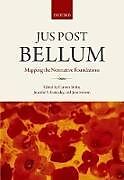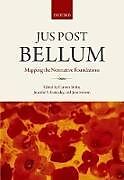Jus Post Bellum
Einband:
Fester Einband
EAN:
9780199685899
Untertitel:
Mapping the Normative Foundations
Genre:
Internationales Recht
Autor:
Carsten (Professor of International Crimina Stahn
Herausgeber:
Oxford Academic
Anzahl Seiten:
600
Erscheinungsdatum:
13.02.2014
ISBN:
978-0-19-968589-9
Autorentext
Carsten Stahn is Professor of International Criminal Law and Global Justice at Leiden University and Program Director of the Grotius Centre. He is the author of The Law and Practice of International Territorial Administration: Versailles to Iraq and Beyond. He has published articles on international criminal law and transitional justice in leading international journals (American Journal of International Law, European Journal of International Law, Journal of International Criminal Justice, Harvard International Law Journal), and edited several collections of essays in the field. Jennifer Easterday is a Researcher for the 'Jus Post Bellum' project. She is also an international justice consultant and a Trial Monitor for the Open Society Justice Initiative. She previously worked for International Criminal Law Services, an NGO based in The Hague, on a variety of international criminal law capacity-building projects in domestic jurisdictions in the former Yugoslavia and Africa. She has also worked as a Senior Researcher and Trial Monitor for the UC Berkeley War Crimes Studies Center, researching and monitoring the Special Court for Sierra Leone trial of Charles Taylor. She has experience at the ICTY and with other international criminal law and human rights NGOs in the United States and Latin America. She received her Juris Doctor from the University of California, Berkeley School of Law and is a member of the California State Bar. Jens Iverson is a Researcher for the 'Jus Post Bellum' project and an attorney specializing in public international law. A member of the California Bar, the Thurston Society, and the Order of the Coif, he received his Juris Doctor cum laude from the University of California, Hastings, and his Bachelor of Arts from Yale University. He has worked with the Cambodian Genocide Program, the Documentation Centre of Cambodia, and the Coalition for the International Criminal Court. As the co-founder of a human rights clinic, he helped represent the former Prime Minister of Haiti in a successful petition to the Inter-American Commission on Human Rights that ultimately resulted in a landmark ruling requiring Haitian prison reform. He has practiced at the International Criminal Tribunal for the former Yugoslavia on both the Popovic et al and Prlic et al cases.
Klappentext
Jus post bellum is the body of international legal norms and rules of international law that applies to a post-conflict situation as it moves to a status of peace. This book provides a detailed legal analysis of all aspects of jus post bellum, and uses case studies to show its relevance to the reality of situations on the ground.
Zusammenfassung
This is an open access title available under the terms of a CC BY-NC-ND 4.0 licence. It is free to read at Oxford Scholarship Online and offered as a free PDF download from OUP and selected open access locations. The successful transition from armed conflict to peace is one of the greatest challenges of contemporary warfare. The laws and principles governing transitions from conflict to peace (jus post bellum) have only recently gained attention in legal scholarship. There are three key questions concerning the core of jus post bellum: the law ('jus'), the temporal aspect ('post'), and different types of armed conflict ('bellum') involved. This book explores the different legal meanings and components of the concept, including its implications in contemporary politics and practice. The book provides a detailed understanding of the development and nature of jus post bellum as a concept, including its foundations, criticisms, and relationship to related concepts (such as transitional justice, and the responsibility to protect). It investigates the relationship of the concept to jus ad bellum and jus in bello, and its relevance in internal armed conflicts and peacebuilding. There are significant problems brought about in relation to the ending of conflict, including indicators for the end of conflict, exit strategies, and institutional responses, which are also assessed. The book identifies the key components of a 'jus', drawing on disparate bodies and sources of international law such as peace agreements, treaty law, self-determination, norms governing peace operations and the status of foreign armed forces, environmental law, human rights, and amnesty law. Taking into account perspectives from multiple disciplines, the book is important reading for scholars, practitioners, and students across many fields, including peace and conflict studies, international relations, and international humanitarian law.
Inhalt
Introduction ; PART 1. FOUNDATION AND CONCEPTIONS OF JUS POST BELLUM ; (I) FOUNDATION, CONCEPT, AND FUNCTION ; 1. Jus Post Bellum, Grotius, and Meionexia ; 2. At War's End: Time To Turn to Jus Post Bellum? ; 3. Jus Post Bellum as a Partly Independent Legal Framework ; 4. Jus Post Bellum: An Interpretive Framework ; (II) JUS POST BELLUM AND RELATED CONCEPTS ; 5. Jus Post Bellum and Transitional Justice ; 6. R2P and Jus Post Bellum: Towards a Polycentric Approach ; (III) JUS POST BELLUM AND ITS DISCONTENTS ; 7. The Concept of Jus Post Bellum in International Law: A Normative Critique ; 8. Waging Peace: Ambiguities, Contradictions, and Problems of a Jus Post Bellum Legal Framework ; 9. The Compatibility of Justice for Women with Jus Post Bellum Analysis ; PART 2. RECONCEPTUALISING 'BELLUM' AND 'PAX' ; 10. Of Jus Post Bellum and Lex Pacificatoria: What's in a Name? ; 11. The Gentle Modernizer of the Law of Armed Conflict? ; 12. Navigating the Unilateral/Multilateral Divide ; 13. The Application of Jus Post Bellum in Non-International Armed Conflict ; 14. Post-War States: Differentiating Patterns of 'Peace' ; PART 3. DILEMMAS OF THE 'POST' ; (I) DILEMMAS OF CLASSIFICATION ; 15. Temporal Dimensions of Jus Post Bellum: Some Dilemmas and Possible Responses ; 16. From Jus in Bello to Jus Post Bellum: When do Non-International Armed Conflicts End? ; (II) INSTITUTIONAL DILEMMAS AND STRATEGIES ; 17. Conflict Termination from a Human Rights Perspective: State Transitions, Power-Sharing, and the Definition of the 'Post' ; 18. Post-Occupation Law ; 19. The Norms and Politics of Exit: Ending Post-Conflict Transitional Administrations ; 20. Facilitating Post-Conflict Reconstruction: Is the UN Peacebuilding Commission Successfully Filling an Institutional Gap or Marking a Missed Opportunity? ; PART 4. THE 'JUS' IN JUS POST BELLUM ; 21. Jus Post Bellum, Peace Agreements, and Constitution Making ; 22. Targeting the State in Jus Post Bellum: Towards a Theory of Integrated Sovereignties ; 23. Creating Governments in the Aftermath of War: Is there a Role for International Law? ; 24. The Status of Foreign Armed Forces Deployed in Post-Conflict Environments: A Search for Basic Principles ; 25. The Norm of Environmental Integrity in Post-Conflict Legal Regimes ; 26. Should Insurgents Be Amnestied? ; Conclusion

Leider konnten wir für diesen Artikel keine Preise ermitteln ...
billigbuch.ch sucht jetzt für Sie die besten Angebote ...
Die aktuellen Verkaufspreise von 6 Onlineshops werden in Realtime abgefragt.
Sie können das gewünschte Produkt anschliessend direkt beim Anbieter Ihrer Wahl bestellen.
Loading...
Die aktuellen Verkaufspreise von 6 Onlineshops werden in Realtime abgefragt.
Sie können das gewünschte Produkt anschliessend direkt beim Anbieter Ihrer Wahl bestellen.
| # | Onlineshop | Preis CHF | Versand CHF | Total CHF | ||
|---|---|---|---|---|---|---|
| 1 | Seller | 0.00 | 0.00 | 0.00 |
